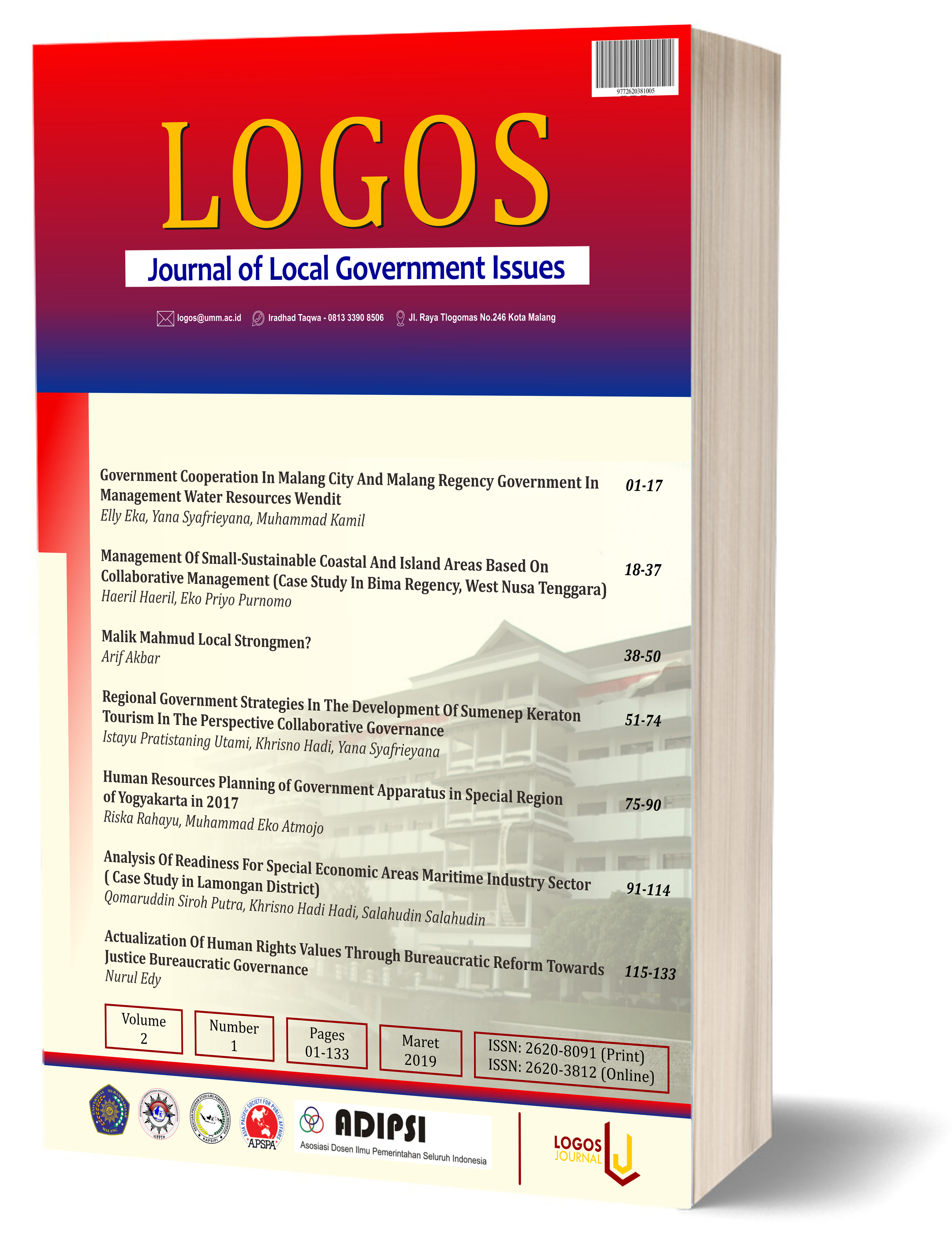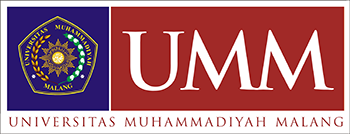Management of Small-Sustainable Coastal and Island Areas Based on Collaborative Management (Case Study in Bima Regency, West Nusa Tenggara)
DOI:
https://doi.org/10.22219/logos.Vol2.No1.18-37Abstract
Given the rare terrain of land resources, the primary targets of Indonesia's economic development will be based on coastal zones and small islands and their sources. If not supported by the implementation of appropriate management policies, it can reduce the ability of coastal and small island ecosystems in the provision of sustainable natural resources. This research was conducted in Bima regency of West Nusa Tenggara aims to find out collaborative management in the effort of sustainable management of natural resources of the coastal area and small islands. Data collection is done through observation, interview, and questionnaire distribution. Involve 100 respondents consisting of, Head of Marine and Fishery, Head of Environment Agency, Head of Tourism Office, Community Monitoring Group, Non-Governmental Organization, and Environmental Community, and coastal community of districts Sape, Bolo, Lambu, Langgudu, and Wera. The result showed the implementation of collaborative management in the management of natural resources of coastal areas and small islands in a district of Bima has not active conducted when viewed from the achievements and respondents assessment based on the index scale of 1 to 5 on the indicators of the collaborative implementation management and sustainable development goals. Where the average value of collaborative management is only 3.25 or with enough category, also so in the implementation of sustainable development goals found the average value of the index of 3.32 even with enough class.
Keyword: Sustainable development, collaborative management, coastal area and small islands, Bima Regency West Nusa Tenggara.
Downloads
References
Armitage, D. R., et al. (2009). "Adaptive Co‐Management for Social–Ecological Complexity." Frontiers in Ecology and the Environment 7(2): 95-102.
Armitage, D., et al. (2010). Adaptive Co-Management: Collaboration, Learning, and Multi-Level Governance, UBC Press.
Berkes, F. (2009). "Evolution of Co-Management: Role of Knowledge Generation, Bridging Organizations and Social Learning." Journal of environmental management 90(5): 1692-1702.
Blumenthal, D. and J.-L. Jannink (2000). "A Classification of Collaborative Management Methods." Conservation Ecology 4(2).
Borrini-Feyerabend, G. (1996). Collaborative Management of Protected Areas: Tailoring the Approach to the Context, IUCN-The World Conservation Union Gland, Switzerland.
Dahuri, R. (2003). "Paradigma Baru Pembangunan Indonesia Berbasis Kelautan Naskah Orasi Ilmiah Pengukuhan Guru Besar Tetap Ilmu Pengelolaan Sumberdaya Pesisir dan Lautan. Institut Pertanian Bogor, Bogor.
Farhan, A. and S. Lim (2014). "Assessment of Ocean and Coastal Policy Effectiveness in Seribu Islands, Indonesia." International Journal of Geoinformatics 10(3).
Fauzi, A. and A. Oxtavianus (2014). "The Measurement of Sustainable Development in Indonesia."
Ferrol-Schulte, D., et al. (2015). "Coastal Livelihood Vulnerability to Marine Resource Degradation: A Review of The Indonesian National Coastal and Marine Policy Framework." Marine Policy 52: 163-171.
Harahab, N. (2010). Penilaian ekonomi ekosistem hutan mangrove & aplikasinya dalam perencanaan wilayah pesisir, Graha Ilmu.
Hidayat, H., et al. (2011). Politik Ekologi: Pengelolaan Taman Nasional Era Otda, Yayasan Pustaka Obor Indonesia.
Ife, J. and F. Tesoriero (2008). "Community Development: Alternatif Pengembangan Masyarakat di Era Globalisasi." Yogyakarta: Pustaka Pelajar: 265.
Iskandar, Z. (2012). "Psikologi Lingkungan: Teori dan Konsep." Bandung: Refika Aditama.
Lin, N. (2017). Building a Network Theory of Social Capital. Social capital, Routledge: 3-28.
Miles, M. B., et al. (1994). Qualitative Data Analysis: An Expanded Sourcebook, sage.
Paul, S. (1987). Community Participation in Development Projects, World Bank Washington, DC.
Pomeroy, R., et al. (2010). "Ecosystem-Based Fisheries Management in Small-Scale Tropical Marine Fisheries: Emerging Models of Governance Arrangements in The Philippines." Marine Policy 34(2): 298-308.
Rachmad, D. S. K. (2012). "Sosiologi Lingkungan dan Sumber Daya Alam Perspektif Teori dan Isu-isu Mutakhir." Yogyakarta: Ar-Ruzz Media.
Robert, K. W., et al. (2005). "What is Sustainable Development? Goals, Indicators, Values, and Practice." Environment: science and policy for sustainable development 47(3): 8-21.
Downloads
Published
How to Cite
Issue
Section
License
Copyright (c) 2019 Haeril Haeril, Eko Priyo Purnomo

This work is licensed under a Creative Commons Attribution-ShareAlike 4.0 International License.
Authors who publish with this journal agree to the following terms:
- Authors retain copyright and grant the journal right of first publication with the work simultaneously licensed under a Creative Commons Attribution-ShareAlike 4.0 International License. that allows others to share the work with an acknowledgment of the work's authorship and initial publication in this journal.
- Authors are able to enter into separate, additional contractual arrangements for the non-exclusive distribution of the journal's published version of the work (e.g., post it to an institutional repository or publish it in a book), with an acknowledgment of its initial publication in this journal.
- Authors are permitted and encouraged to post their work online (e.g., in institutional repositories or on their website) prior to and during the submission process, as it can lead to productive exchanges, as well as earlier and greater citation of published work (See The Effect of Open Access).

This work is licensed under a Creative Commons Attribution-ShareAlike 4.0 International License.













